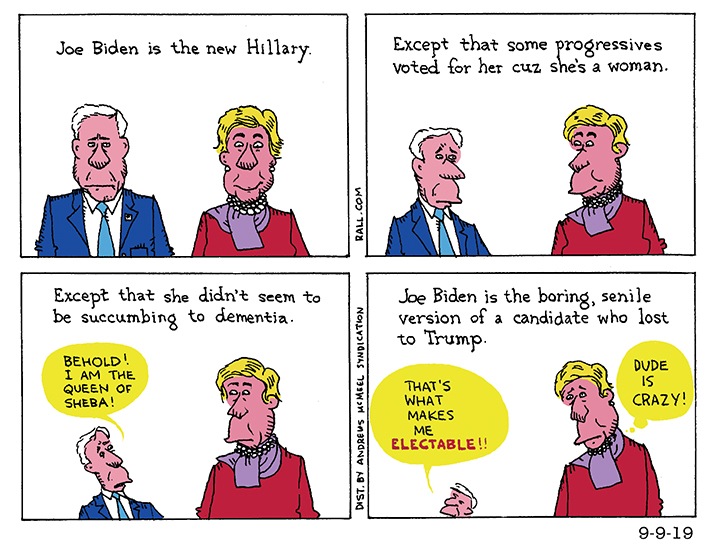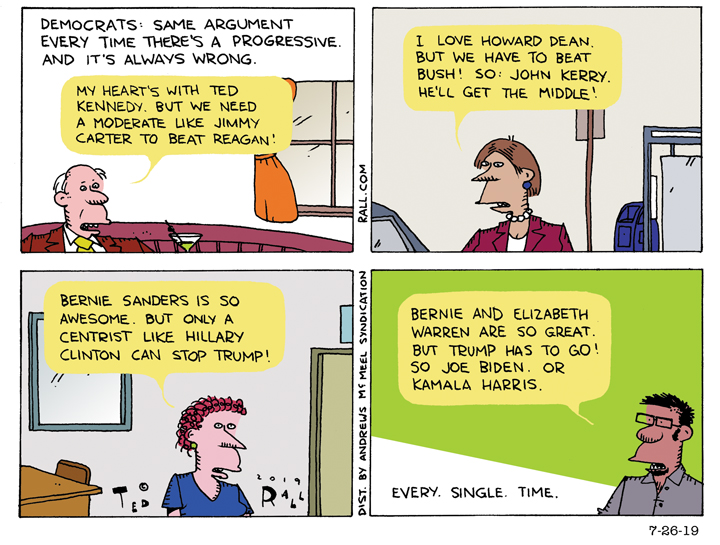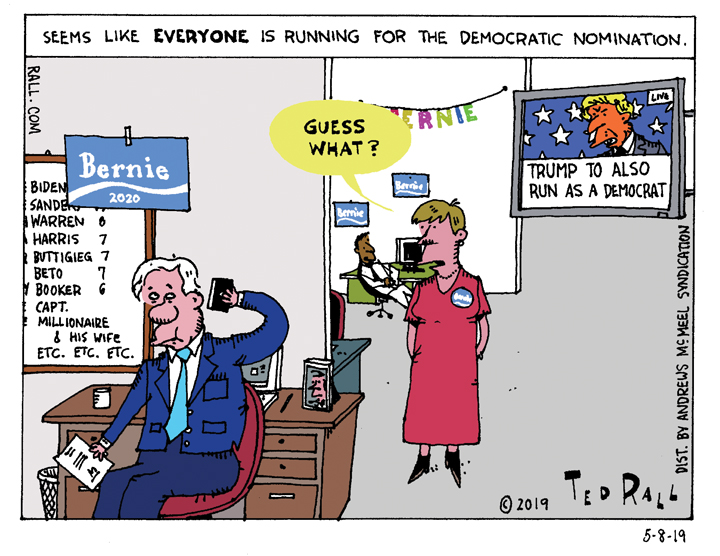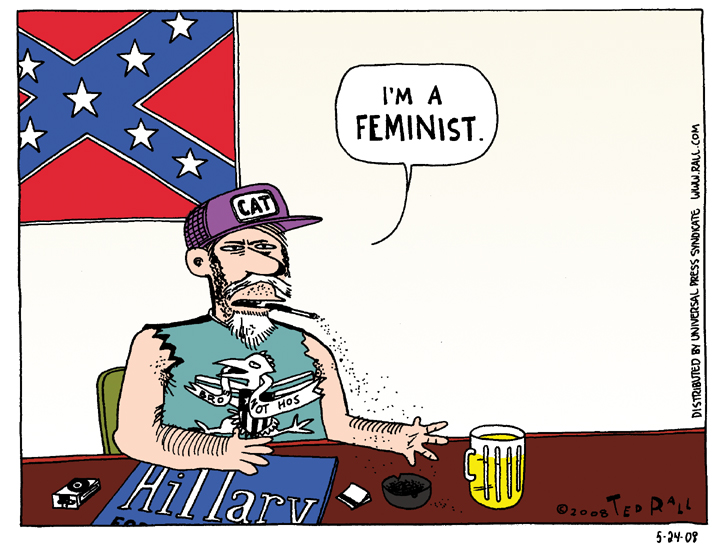The main appeal of Joe Biden’s candidacy for president is that he would supposedly be more electable than other Democratic presidential candidates. However, he is also the second coming of Hillary Clinton. She lost to Trump. But Biden, if anything, seems to have fewer advantages than she did.
Every Single Time, Centrists Say They’ll Win. And They Never Do.
It’s the oldest debate within the Democratic Party: what to do about a progressive insurgent candidate? Whether it’s Ted Kennedy’s challenge against Jimmy Carter in 1980, Howard Dean against John Kerry in 2004 or Bernie Sanders against Hillary Clinton, moderates and centrists always say the same thing: in order to win, you need those swing voters. That means you have to pick the moderate choice. The problem with that argument is that it never really works out in the general election. Kennedy and Dean’s voters stayed home in November. 3 to 4,000,000 Bernie Sanders primary voters never showed up for Hillary Clinton. Now the same argument is being floated again, this time in favor of Joe Biden.
SYNDICATED COLUMN: Hillary to Bernie Supporters: Don’t Vote For Me
 Hey Bernie supporters: Hillary has a talking point for you.
Hey Bernie supporters: Hillary has a talking point for you.
Confident that she has the Democratic nomination pretty much locked down and turning toward a general election contest against Donald Trump, Secretary Clinton’s surrogates and paid Internet trolls are targeting Sanders devotees via email and seeding comment threads on political websites with a low-key sales pitch.
It goes like this: We’re not asking you to vote for Hillary in November. We are asking you to work for and donate to “down ticket” Democratic candidates for Congress, governor, state rep and so on. Oh, and if you could kindly hold your fire against Hillary — because those attacks help Trump — that would be awesome too, thanks.
Like all things Clinton, this tightly scripted DNC-approved don’t-vote-for-me-vote-for-other-Dems argument carries more than a whiff of triangulation, big data analytics and well-managed focus groups. It also reeks of desperation.
At this stage in a presidential campaign, the likely nominee normally wants to unify the party by convincing voters who voted against her in the primary to see her as next best, good enough, and enough of a champion for some of her defeated opponent’s ideas to justify supporting her with some enthusiasm. I can’t recall, even following the bitter Democratic primary fight in 1980, Jimmy Carter telling Ted Kennedy’s acolytes not to bother with him but to please pull levers for Democratic state senators.
Hillaryites are sweating the progressive #BernieorBust movement — a recent poll of Sanders voters found one out of four swearing they won’t vote for Clinton in November, no way, no how. Like Miley Cyrus’ pledge to leave the U.S. if Trump wins, these promises are more hot air than statements of serious intent. But it’s not like that 25% drops to 0 by November 8th. Some Berners will stay home on election day. Disaffected Sanderians will give Jill Stein’s Green Party the biggest surge it has ever seen. (That’s probably how I’ll roll.)
And yes — despite the opinions of the center-right pundits who have been wrong about everything all year long — a significant number of liberal Democrats will defect to Donald Trump. As a friend told me, “I always vote Democratic. In this race, Donald Trump is the Democrat and Hillary Clinton is the Republican.”
If Hillary wins the nomination, she’ll need as many votes from former Berners as she can get. So why is she giving up on them already?
There are two answers.
- She doesn’t think she can convince Sanders’ supporters that she’s a good-enough second-best.
- She doesn’t want to try.
She may be right about the first point. Stretching back over more than two decades, Clinton’s public record in national politics is too long and too consistent to make a credible case that she has a left-of-center bone in her body. From Hillarycare to NAFTA to welfare reform to the crime bill to Iraq and Libya and Syria, she’s always sided with neo-con war profiteers and corporations over people. (Hillary’s folks claim that she was secretly against NAFTA, in private, before she came out in favor of it, in public. But secretly doesn’t count in politics.)
Hillary’s refusal to make concessions to Sanders’ surprisingly successful democratic-socialist insurgency is highly illuminating about who she is and where she stands.
Clinton and Sanders are now tied in national polls. Does anyone doubt that if he were as well known when he began his campaign last year as he is now, that he would have trounced her? Given Sanders’ popularity and the real threat he presented to her, a smarter and/or less pigheaded candidate than Hillary would have co-opted the man, his ideas and his supporters. But there’s zero sign that she’s considering him as her vice president or a cabinet position. She has stolen many of Sanders’ topics. But she hasn’t adopted any of his major ideas.
At one of the debates she misleadingly implied that she supports Bernie’s national $15/hour minimum wage. Actually, she supports a Scroogesque $12. (If the minimum wage had kept up with inflation, it would be over $22.)
She still doesn’t want to make public college tuition free, as Bernie Sanders does. Nor would she lift a finger to replace the insurance profit protection racket that is Obamacare with the universal healthcare available around the globe.
In Hillary Clinton we have a right-wing Democrat who campaigned as a right-wing Democrat and who will now tack even farther right this summer and fall. She’s so far right that she won’t even bother to pretend to throw a bone to progressives, much less bring Sanders or his ideas into an Abe Lincoln-style Team of Rivals à la Hillary.
No one should say they’re surprised when President Hill turns out to a rabid rightie.
(Ted Rall is the author of “Bernie,” a biography written with the cooperation of Democratic presidential candidate Bernie Sanders. “Bernie” is now on sale online and at all good bookstores.)
SYNDICATED COLUMN: What’s Up with Black Voters?
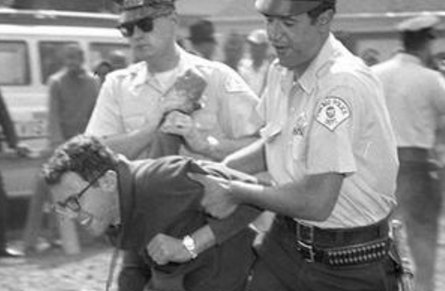
Thomas Frank made a splash a decade ago with a bestseller called “What’s the Matter With Kansas?” In his book Frank attempted to answer the question: why do so many Americans — working-class Americans — vote against their economic and social interests — i.e., Republican?
I’ve been thinking about Frank a lot lately. Beginning with the Southern states on Super Tuesday and continuing through Tuesday’s important New York primary, the crucial support of black voters has created a “firewall” for Hillary Clinton against the insurgent candidacy of Bernie Sanders in the Democratic race for president. Yet Sanders is far more liberal than Clinton, and has a far better record on black issues than she does.
What’s going on? Why are so many black Americans voting against their own interests — i.e., for a Democrat in Name Only?
Sanders, the liberal radical, in the race, carries white states. Clinton, the conservative incrementalist, carries those that are more ethnically diverse. In New York this week, the pattern continued (though there’s strong evidence the primary was stolen by Clintonista-Cuomoite henchmen, but that’s another story). According to exit polls, Hillary carried 75% of African-Americans in New York, compared to 49% of whites. Because it’s uncomfortable for liberals to talk about, no one much does. But the data is clear.
There is a glaring racial divide within the Democratic Party.
This appears to be new. On November 7, 1984, posters went up in my old neighborhood, the Manhattan Valley section of upper Manhattan. They were printed by the city Democratic Party, thanking residents for voting for Walter Mondale over Ronald Reagan at the highest rate in the United States. Then as now, the area was diverse: predominantly Latino, with many blacks and, due to nascent gentrification, a growing white presence. We were all — young white people like me, young people of color, middle-aged people of color, old people of color — on the same page politically: as far left as allowed by law. If there’d been a Bernie Sanders on the ballot in 1984, he would have gotten 99% of Manhattan Valley.
Things have changed over the last 32 years. It’s hard to tell when or how or why. Howard Dean and John Edwards (both insurgent liberals who had trouble attracting black votes) included, Democratic Party politics hasn’t seen any major candidate as left or progressive as Bernie Sanders during that period (really, since George McGovern in 1972). Until now, it’s been hard to clearly perceive the race gap.
Privately, many of Sanders’ supporters are paraphrasing Thomas Frank: what, they wonder, is going on with black people? If the Democratic primary campaign were based on the issues and the candidates’ personal histories, we’d expect blacks to be a key voting bloc for Bernie, not Hillary.
On racial justice issues, Bernie is a zillion times better than Hillary.
During the Civil Rights movement in 1963, Bernie Sanders got arrested to protest housing segregation and traveled to the March on Washington to hear Dr. Martin Luther King speak. Meanwhile, Hillary Clinton was an “active young Republican and, later, a Goldwater girl.” Barry Goldwater voted against the Civil Rights Act.
Sanders has consistently championed racial equality and fought poverty and income disparity, two economic scourges that hurt blacks worse than anyone else. As First Lady, Clinton pushed her husband’s 1994 crime bill, which accelerated mass incarceration of blacks. (Though she and Bill now admit it went too far, neither have proposed actually doing something to fix it, like letting those sentenced under the law out of prison.) She also backed “welfare reform,” which drastically increased extreme poverty, especially among blacks. And while running for president in 2008, she was the only candidate who said she wouldn’t end the crack and powder cocaine sentencing disparity. Hillary is essentially a Republican.
Since when do blacks vote Republican?
One possible answer is name recognition. Hillary Clinton has been a boldface name in politics since 1993. As recently as September, 38% of all Americans had never heard of Bernie Sanders. But that doesn’t explain the race gap. Sanders was an obscure figure to whites and blacks alike.
Another is class. Influenced by Marx, Old Left Democrats like Sanders see racism, sexism and other forms of oppression as subsets of class warfare by ruling elites against the rest of us. Today’s Democrats have abandoned class analysis in favor of identity politics.
So even though she’s wealthy, devotees of identity politics see Hillary Clinton as a victim of oppression because she’s a woman. Even though he’s Jewish and middle-class, identitarians consider Bernie Sanders a privileged white male. Perhaps this is why some black voters relate to her more than the old guy.
Then there’s a factor so ugly that many of us on the left don’t like to discuss it: black anti-Semitism. According to Anti-Defamation League surveys, anti-Semitism is significantly more widespread among African-American and Latino voters than the population as a whole. Some black voters may be holding Bernie’s Jewishness against him.
Ageism may play a role too: in part thanks to obvious plastic surgery, Hillary, 68, looks younger than Bernie, 74. But are blacks more ageist than white millennials?
Interesting speculation. But let’s look at what we know about how Democrats chose their candidates in New York. Hillary voters told pollsters they prioritized (in order) experience, electability (though Bernie is actually more electable) and continuing Obama’s policies.
Bernie voters said the factors they most cared about were honesty and trustworthiness, and policies more liberal than Obama’s.
There’s more than a whiff of the identity politics explanation there. Obama has been weak on racial issues. Understandably, many black voters nevertheless value his historical import as the first black president and remain loyal to him, despite his inaction on things that matter to them. Hillary was, of course, Obama’s secretary of state. And she invokes him all the time.
The (false) belief that Hillary is more electable than Bernie is, I think, the most underappreciated factor driving black support for her. The Rev. Al Sharpton ran for president in 2004. After he got trounced in the South Carolina primary, people wondered why a state with so many blacks delivered so few votes for the one black candidate in the race. One answer was instructive:
“The black vote is looking for a winner and they are not looking to make a statement about race. John Kerry is one of the whitest guys, you know what I mean,” David Bositis, an analyst with the Joint Center for Political and Economic Studies in Washington, told The New York Times at the time. For blacks, beating Bush was job one.
Times columnist Charles M. Blow recently made a similar point, that in order to survive blacks (especially in the South) have had to be cautious. Black voters think Hillary is better known and thus, in their opinion, more electable.
This year, black Democrats may be trying to make a statement about race, while being cautious. They may instead wind up increasing the chances of a victory by Donald Trump.
(Ted Rall is the author of “Bernie,” a biography written with the cooperation of Democratic presidential candidate Bernie Sanders. “Bernie” is now on sale online and at all good bookstores.)
SYNDICATED COLUMN: Bernie Sanders Could Win. America Could Become Socialist. Are We Witnessing the Failure of Propaganda?

The independent senator from Vermont says the economic system is rigged against working-class Americans. He’s right.
The electoral political system is a subsidiary of those who rule the economy. Which is why Bernie Sanders never stood a chance. The political system was rigged against him.
And yet, despite the formidable institutional obstacles stacked against him, Sanders is doing great: largely considered a shoo-in to win New Hampshire, leading in Iowa, closing the gap nationally. Surprised pundits are marveling at his popular momentum, ground organization and fundraising prowess. There is now a credible path to the Democratic nomination and, if he runs against GOP frontrunner Donald Trump, to the White House.
Center-right Hillaryworld wants to know: how did this happen?
Leftists wonder: is this cause for hope?
It is an amazing story. Everyone in a position to block Sanders’ campaign did everything they could to sabotage him.
Knowing that coverage is the essential oxygen of politics, the media mostly ignored him. By one measure, corporate media gave Trump 23 times more coverage than Sanders! On the few occasions when they spilled a little ink on Bernie, it was to insult him and his socialist politics. (My personal Exhibit A was a New York Times piece that carried a photo that emphasized his bald spot.)
Marginalization always used to work. Remember John Edwards? His 2008 primary campaign was doomed because TV networks refused to cover him. But the media’s cold shoulder isn’t hurting Bernie.
In the bag for Hillary Clinton and remembering the lesson of 2008 — the more voters hear from her the less they like her — the Democratic National Committee fed her aura of inevitability by refusing to give Bernie the exposure and legitimacy offered by a robust round of debates. Debates, the few of them the manipulative DNC chair and Hillary toady Debbie Wasserman Schultz allowed to take place, were scheduled for the nights known for low television viewership.
That tactic backfired. Hillary did better than Bernie in the first three debates. But no one saw her flex her foreign-affairs muscles.
Bernie got nothing but chicanery from the DNC, to the point that the Sanders camp had to sue to access its own voter data. Which only reinforced his image as a rebel — not easy for a U.S. senator — and further endeared him to his supporters.
Despite everything, Sanders could win.
Moreover, it’s not just Sanders the candidate who is doing well. His “unusual” politics are becoming usual.
Sanders’ self-labeling as a democratic socialist — universally considered political suicide in the United States — is catching on. In one of the most surprising poll results of the 2016 race, a recent survey of likely Iowa caucus-goers finds that more of them call themselves socialist (43%) than capitalist (38%).
Where did Iowa’s socialists come from? They certainly weren’t indoctrinated by the mainstream system. No ideology, not even radical Islam, has come under heavier systemic assault than socialism. From the Palmer Raids of a century ago to McCarthyism to the Tea Party’s (sadly mistaken) insinuations that President Obama is a secret red, socialism has been the bête rouge of mainstream American politics: reviled in ridiculous movies, misrepresented and excluded from acceptable public debate, even on the watered-down liberalism that passes for a “left.” Even in schools, socialism and communism are lied about — if they’re mentioned at all.
My friend the film critic Cole Smithey calls what we’re seeing “the failure of propaganda.”
It’s certainly a notable moment. The ruling elite’s old tricks are indeed failing them. But it’s too early to declare propaganda dead and gone. Propaganda works. That’s why those in power keep using it.
Here’s what I think is really going on: old institutions have been discredited. Sanders’ growing support and Iowa’s surprisingly socialist hordes reflect public contempt for everyone in charge.
Pundits have mostly focused on populist anger on the right, embodied by the wild neofascist-lite pronouncements of Donald Trump. But there is just as much rage on the left excluded from the Democratic Party since George McGovern’s 1972 defeat to Richard Nixon. Divided or not, one thing Americans can agree upon is that they don’t trust government — on the right to leave them alone, and on the left to help them out.
Propaganda is still effective. But when it’s broadcast by elites who are widely despised, its effect is opposite of what’s intended.
Hillary Clinton racks up endorsements from unions and left-leaning organizations like Planned Parenthood. In the past, these would have given her a boost. This year, it reinforces a negative framing of her as bought and paid for by special interests.
In days of yore the endorsement of a young actress starring in a hip TV show would have been a feather in Hillary’s cap. In 2016, it’s hard to imagine how poor Lena Dunham will wash away the stink of Hillary’s hard-edged corporatism.
Hillary has an incredible resume: first lady, senator, secretary of state. This year, she’d be better off as an outsider. Credentials subtract from her credibility. What’s wrong now, voters feel, is partly her fault.
Bernie Sanders’ campaign gets accused of improperly accessing Hillary’s data on DNC servers. In the old days, the smell of an ethical breach might have doomed his candidacy. Now, because Democratic voters are disgusted by the DNC’s brazen attempt to fix the primaries for Hillary, the controversy looks like another sleazy attack on Bernie the outsider.
Because the public distrusts journalists, the media blackout works in Bernie’s favor. Through the lens of this new politics of contempt, if the powers that be want to censor the “wild and crazy” socialist senator, he musn’t be that bad after all.
What Bernie really needs is for Hillary to receive Obama’s endorsement (which she obviously, foolishly, wants.) That would be the end of her.
The same reverse-propaganda paradigm holds true for socialism. As America’s continuously lauded state religion, capitalism takes the blame for all its associated evils: layoffs, stagnant wages, home foreclosures, health insurance companies that don’t pay claims. If socialism is anti-capitalism, an alienated populace has evidently concluded, it doesn’t matter that they don’t know very much about it. Socialism can’t be that bad.
If elected, President Sanders will be ineffective. Either that, or he’ll sell us out. Such is the nature of this system: it chews up and spits out those who don’t go along to get along.
A Sanders victory would nonetheless mark an important prerevolutionary moment. As Ché Guevara observed, people will not resort to armed struggle before they exhaust every last opportunity to nonviolently reform the existing system by casting their votes in elections.
A Sanders Administration would be our best, last, 100% doomed shot at fixing a rigged regime.
(Ted Rall is the author of “Bernie,” a biography written with the cooperation of Democratic presidential candidate Bernie Sanders. “Bernie” is being released today.)
Bernie
Publication Date: January 19, 2016
Order at Amazon!
As a kid growing up in Brooklyn, Bernie Sanders was surrounded by grinding poverty that turned families against each other as they scrimped and saved to pay their bills.
Bernie saw politics as his chance to give a decent life to everyone, not just those born to wealth or the lucky few who hit it big. But the Democratic Party and the country overall were moving to the right.
Bernie joined a tiny independent party from Vermont. He ran for mayor. As a socialist. And won.
Now he’s running for the Democratic nomination for president. Check out his amazing story and what his campaign means to you.
Current Events/Biography, 2015
Seven Stories Press Paperback, 5″x7″, 208 pp., $16.95
To Order A Personally Signed Copy directly from Ted:

